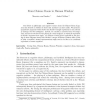Free Online Productivity Tools
i2Speak
i2Symbol
i2OCR
iTex2Img
iWeb2Print
iWeb2Shot
i2Type
iPdf2Split
iPdf2Merge
i2Bopomofo
i2Arabic
i2Style
i2Image
i2PDF
iLatex2Rtf
Sci2ools
149
click to vote
ICGA
2010
2010
From Chinese Room to Human Window
The debate in philosophy and cognitive science about the Chinese Room Argument has focused on whether it shows that machines can have minds. We present a quantitative argument which shows that Searle's thought experiment is not relevant to Turing's Test for intelligence. Instead, we consider a narrower form of Turing's Test, one that is restricted to the playing of a chess endgame, in which the equivalent of Searle's argument does apply. An analysis of time/space trade-offs in the playing of chess endgames shows that Michie's concept of Human Window offers a hint of what a machine's mental representations might need to be like to be considered equivalent to human cognition.
| Added | 17 May 2011 |
| Updated | 17 May 2011 |
| Type | Journal |
| Year | 2010 |
| Where | ICGA |
| Authors | Maarten van Emden, André Vellino |
Comments (0)

